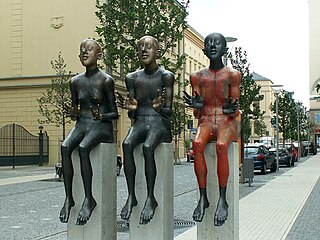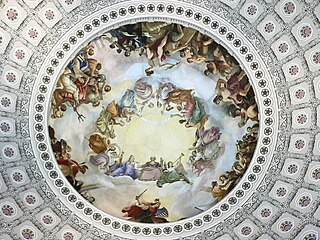Related Research Articles

Christianity is an Abrahamic monotheistic religion based on the life and teachings of Jesus of Nazareth. It is the world's largest and most widespread religion with roughly 2.4 billion followers representing one-third of the global population. Its adherents, known as Christians, are estimated to make up a majority of the population in 157 countries and territories. They believe that Jesus is the Son of God, whose coming as the Messiah was prophesied in the Hebrew Bible and chronicled in the New Testament.
Deism is the philosophical position and rationalistic theology that generally rejects revelation as a source of divine knowledge, and asserts that empirical reason and observation of the natural world are exclusively logical, reliable, and sufficient to determine the existence of a Supreme Being as the creator of the universe. More simply stated, Deism is the belief in the existence of God, solely based on rational thought without any reliance on revealed religions or religious authority. Deism emphasizes the concept of natural theology—that is, God's existence is revealed through nature.
Evangelicalism, also called evangelical Christianity or evangelical Protestantism, is a worldwide interdenominational movement within Protestant Christianity that affirms the centrality of being "born again", in which an individual experiences personal conversion; the authority of the Bible as God's revelation to humanity; and spreading the Christian message. The word evangelical comes from the Greek (euangelion) word for "good news".
Faith, derived from Latin fides and Old French feid, is confidence or trust in a person, thing, or concept. In the context of religion, faith is "belief in God or in the doctrines or teachings of religion". According to Merriam-Webster's Dictionary, faith has multiple definitions, including "something that is believed especially with strong conviction," "complete trust", "belief and trust in and loyalty to God", as well as "a firm belief in something for which there is no proof".
Theism is broadly defined as the belief in the existence of at least one deity. In common parlance, or when contrasted with deism, the term often describes the classical conception of God that is found in monotheism — or gods found in polytheistic religions — a belief in God or in gods without the rejection of revelation as is characteristic of deism.
Civil religion, also referred to as a civic religion, is the implicit religious values of a nation, as expressed through public rituals, symbols, and ceremonies on sacred days and at sacred places. It is distinct from churches, although church officials and ceremonies are sometimes incorporated into the practice of civil religion. Countries described as having a civil religion include France, the former Soviet Union, and the United States. As a concept, it originated in French political thought and became a major topic for U.S. sociologists since its use by Robert Bellah in 1960.

Ummah is an Arabic word meaning "community". It is distinguished from shaʻb, which means a nation with common ancestry or geography. Thus, it can be said to be a supra-national community with a common history.

Toleration is when one allows, permits, or accepts an action, idea, object, or person that one dislikes or disagrees with.
Christianity and other religions documents Christianity's relationship with other world religions, and the differences and similarities.

Sir Herbert Butterfield was an English historian and philosopher of history, who was Regius Professor of Modern History and Vice-Chancellor of the University of Cambridge. He is remembered chiefly for a short volume early in his career entitled The Whig Interpretation of History (1931) and for his Origins of Modern Science (1949). Butterfield turned increasingly to historiography and man's developing view of the past. Butterfield was a devout Christian and reflected at length on Christian influences in historical perspectives.
Criticism of Christianity has a long history which stretches back to the initial formation of the religion in the Roman Empire. Critics have challenged Christian beliefs and teachings as well as Christian actions, from the Crusades to modern terrorism. The arguments against Christianity include the suppositions that it is a faith of violence, corruption, superstition, polytheism, homophobia, bigotry, pontification, abuses of women's rights and sectarianism.
Nazi Germany was an overwhelmingly Christian nation with similarly overwhelmingly self-identified Christian leadership. A census in May 1939, six years into the Nazi era and after the annexation of mostly Catholic Austria and mostly Catholic Czechoslovakia into Germany, indicates that 54% of the population considered itself Protestant, 41% considered itself Catholic, 3.5% self-identified as Gottgläubig, and 1.5% as "atheist". Protestants were over-represented in the Nazi Party's membership and electorate, and Catholics were under-represented.
Criticism of atheism is criticism of the concepts, validity, or impact of atheism, including associated political and social implications. Criticisms include positions based on the history of science, philosophical and logical criticisms, findings in both the natural and social sciences, theistic apologetic arguments, arguments pertaining to ethics and morality, the effects of atheism on the individual, or the assumptions that underpin atheism.

In monotheistic thought, God is usually viewed as the supreme being, creator, and principal object of faith. In polytheistic thought, a god is "a spirit or being believed to control some part of the universe or life and often worshipped for doing so, or something that represents this spirit or being". Belief in the existence of at least one god is called theism.

The religious beliefs of Adolf Hitler, dictator of Nazi Germany from 1933 to 1945, have been a matter of debate. His opinions regarding religious matters changed considerably over time. During the beginning of his political life, Hitler publicly expressed hateful opinions towards Christianity. Most historians describe his later posture as adversarial to organized Christianity and established Christian denominations. He also criticized atheism.

American civil religion is a sociological theory that a nonsectarian quasi-religious faith exists within the United States with sacred symbols drawn from national history. Scholars have portrayed it as a cohesive force, a common set of values that foster social and cultural integration. The ritualistic elements of ceremonial deism found in American ceremonies and presidential invocations of God can be seen as expressions of the American civil religion.

The religious views of George Washington have long been debated. While some of the other Founding Fathers of the United States, such as Thomas Jefferson, Benjamin Franklin, and Patrick Henry, were noted for writing about religion, Washington rarely discussed his religious and philosophical views.
Social conservatism in the United States is a political ideology focused on the preservation of traditional values and beliefs. It focuses on a concern with moral and social values which proponents of the ideology see as degraded in modern society by liberalism. In the United States, one of the largest forces of social conservatism is the Christian right.

The idea that a common Judaeo-Christian ethics or Judeo-Christian values underpins American politics, law and morals has been part of the "American civil religion" since the 1940s. In recent years, the phrase has been associated with American conservatism, but the concept—though not always the exact phrase—has frequently featured in the rhetoric of leaders across the political spectrum, including that of Franklin D. Roosevelt and Lyndon B. Johnson.
References
- ↑ "Providentialism - Oxford Dictionaries". Oxford Dictionaries - English. Archived from the original on November 16, 2016. Retrieved 2016-11-16.
- 1 2 3 4 Guyatt, Nicholas (2007-07-23). Providence and the Invention of the United States, 1607–1876. Cambridge University Press. ISBN 9781139466288.
- ↑ Winship, Michael P. (2000). Seers of God: Puritan Providentialism in the Restoration and Early Enlightenment. Johns Hopkins University Press. ISBN 0-8018-6376-7.
- ↑ Alexandra Walsham (Aug 1994). "'The Fatall Vesper': Providentialism and Anti-Popery in Late Jacobean London". Past and Present. 144: 36–87. doi:10.1093/past/144.1.36.
- ↑ Hamilton, James Frederick. Democratic Communications: Formations, Projects, Possibilities. Lanham: Lexington Books, 2008, p. 35.
- ↑ Smuts, R. Malcolm. Culture and Power in England, 1585-1685. New York: St. Martin's Press, 1999, p. 28.